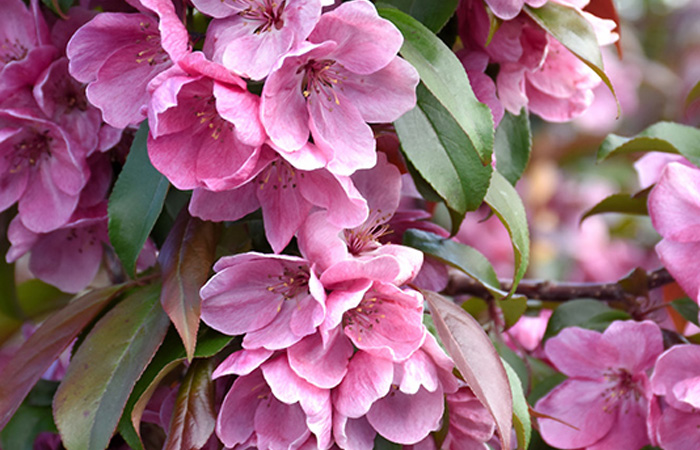Deeply Rooted
The Manitoban Champion

Ever seen one of those purple trees? Every now and then you will spot one in a person’s yard. Quite frankly they are hard to miss.
If you had walked through your neighbourhood 15 years ago and saw a purple tree there were only two main options. The Schubert Chokecherry or the Thunderchild Flowering Crabapple. At first glance their features are similar. They both grow 15′-20′ tall and wide, both will flower and produce small dark fruits, they are both zone 2 cold tolerant, excellent soil tolerance, and of course they both have the beautiful purple leaves.
Of the two the Chokecherry grows faster and the foliage colour is darker. Plus the fruit can be used in baking, preserves or can be eaten fresh! Sound like the better option? Don’t forget that chokecherries are notorious for growing sucker-shoots from the roots and becoming a thicket rather than just one tree. In the end it was black-knot that took the Schubert chokecherry off the market almost completely. Black-knot is a fungal infection that will form black clumps on the branches of chokecherries and their relatives. It will eventually kill the tree if it gets out if hand. It eventually looks like dog poop on a branch. Quite unappealing and incurable. Once it has begun the best treatment you can give is to cut the branch off a foot beneath the infected area and dispose of the fungus. Make sure to disinfect your pruners so as not to spread the sickness further.
So it would seem that the Thunderchild won the day. With beautiful pink flower as opposed to white from the choke cherry it gives even more colour. With time however new problems were realized. Fireblight is a common plonking among flowering fruit trees, some more than others. Thunderchild holds its own with resistance but is not immune. Also smaller yards demanded smaller trees. Many people simply do not have enough space for trees with wider sprawling canopies.
Then the Gladiator entered the scene.
20′ tall but only 12′ wide, darker pink flowers, darker purple leaves, just as cold tolerant and more disease resistant the Gladiator Flowering Crabapple took over the market as the new ornamental purple tree. It grows the same 1″ fruits that drop in October. There is even a dwarf selection of Gladiator that grows only 10′ tall and 6′ wide. It is a rare breed however and hard to get your hands on.
The easiest way to kill the Gladiator? Over watering. All flowering crabapples need well drained soil and consistent moisture. 1″ of rain a week is sufficient under normal conditions. Rabbits and other rodents can do significant damage to young unprotected tree trunks in winter when food is scarce. Always be sure to use tree wraps for winter protection.
In the contest for being the best purple tree the Gladiator won the battle.




